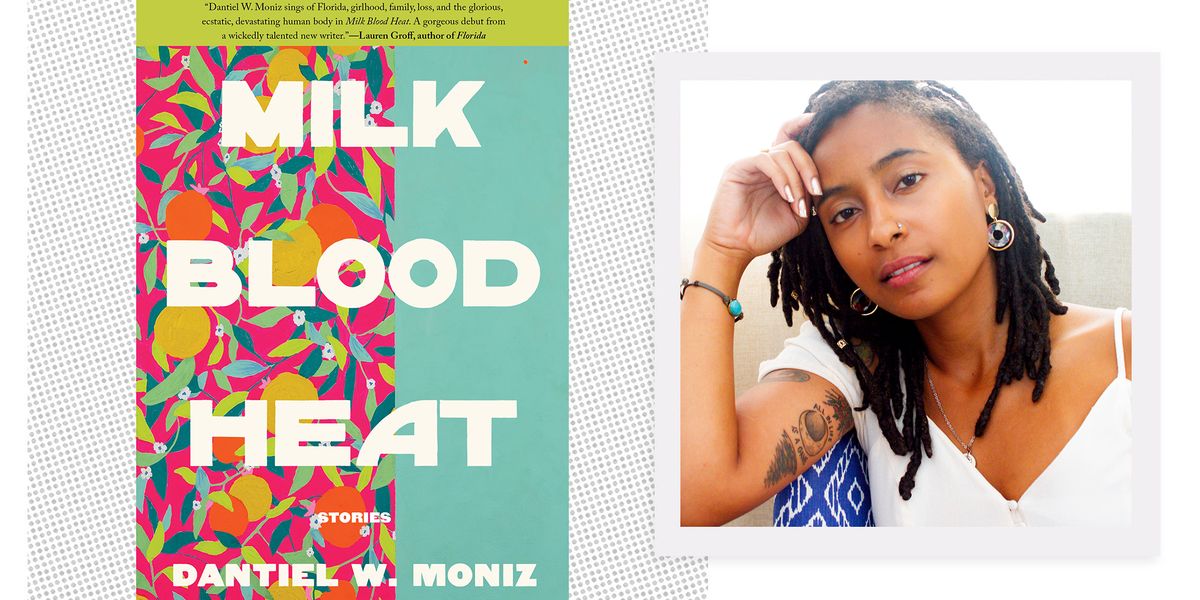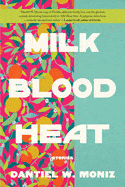Dantiel W. Moniz is a Florida native. That may not always be a celebrated American locus, but Moniz’s writing is joining a burgeoning regional literary canon including Lauren Groff, who blurbed the book, and Kristen Arnett. Moniz’s fiction has appeared in various literary journals, and now her first complete collection, Milk Blood Heat, covers a wider breadth with 11 short stories lauded by the likes of Raven Leilani and Danielle Evans. Moniz addresses charged subjects of racial identity, family obligation, romantic entanglement, and wholehearted friendship, always lingering on fragile moments that are quotidian in scale but existential in meaning. These junctures zoom in on the multiplicities, anxieties, and incongruities of the female experience.
ELLE.com emailed with the author about the chaotic kinship between mothers and daughters, the movie adaptations she’s obsessing over, and her skill in implementing the first person plural.
Why short stories as your form of choice?
More often than not, it’s like I’m uncovering a story than creating it outright. I think it’s amazing that in such a brief space, I can fall so deeply into the lives of characters that they become realized. And there’s all this room for me to imagine how their lives might continue off the page. I hope this collection offers something to readers who would not ordinarily describe themselves as “lovers of the short form.”
Most of these stories have been published individually in literary journals. Were they written gradually came together later, or did you always conceive of them as a growing collection?
A version of the oldest story in the book was written in 2012 in one of my undergraduate workshops, and the rest sometime between 2015 and 2019. I had written a handful of these stories before I realized they might be a collection. At first, I thought, oh no, you keep writing the same thing over and over… without realizing that’s exactly what a story collection does. It takes whatever a writer’s obsessing over and turns it on its face so it can be viewed from many angles.
What cultural resources influenced you as a writer?
I’ve wanted to write a book since very young. I read anything I could get my hands on growing up, and sometimes those might have been age-inappropriate texts, but all of it shaped me. More specifically, I wouldn’t be the writer I am today without Janet Fitch’s White Oleander or Alice Walker’s The Color Purple. And I loved Jeffery Eugenides’s The Virgin Suicides, but it was the film adaptation that really got me. And Baz Luhrmann’s Romeo + Juliet, omg! I’m hugely influenced by films, and get just as much writing technique from watching as I do reading.
Many of the couples and the friendships throughout the collection are interracial. Can you talk about exploring this dynamic?
I grew up in majority-white neighborhoods and school systems, so that informed a lot of my relationships, and thus the way I viewed myself and my place in the world. While these were people who undoubtedly cared for me, there were a lot of moments where—intentionally or not—I was othered by them. And that was sometimes painful and confusing: getting these mixed messages from inside and outside the house, so to speak. I wanted to explore the complexity of those types of relationships, conditioned by our world at large. Black work doesn’t need to engage with whiteness, but it’s something I’m interested in doing right now.
Your characters also address the not-so-subtleties of everyday racism. In “Necessary Bodies,” the main character feels shifty at a restaurant because “No matter where they went or how they acted, their behavior or appearance, their being, was always under scrutiny.” In “An Almanac of Bones,” the young character bristles at her white friend’s mother’s judgement, saying “I pretended not to be offended by her questions, as if the implications of either topic were lost on me.” Can you talk about weaving the sociopolitical reality of racism into storytelling?
The thing is, I do think microaggressions are subtle for people who don’t regularly experience them. It can be as simple as a look or a certain tone of voice, or noticing, as in “Necessary Bodies,” that someone has neglected to greet you in a store or restaurant, though you watched them welcome the people around you. Someone might say, “Are you sure that’s what’s happening?” and it’s like the biggest side-eye moment because, yes, I’ve lived in this body my whole life; I can recognize it easily. It’s one small, persistent way of denying someone else’s experiences.
And while I definitely wanted to acknowledge the realities of the systems we live in while exploring the worlds of these characters, I also wanted it to be clear that race and race issues aren’t always at the forefront of these characters’ minds. Sometimes they’re just worried about the same stuff everyone is: How do I maintain this relationship I have, and what will death be like when it comes for me? Human stuff doesn’t stop happening for anyone, even if there are sometimes more obstacles to complicate that.
There’s a powerful feminist awakening in “Tongues,” in which an adolescent becomes increasingly angry about the passive “good young girl” trope expected of her. Did you intend this as something of a teaching moment?
While these stories explore morality and the conditional traits of goodness or badness, more than anything, I hope they leave space for a reader to examine themselves. For me, that’s what the best fiction does: Pulls me back into my own body, my own life, and re-centers me. Or maybe even knocks me off balance; sometimes that’s desirable or necessary, too. We’re all conditioned for certain kinds of behavior, and it’s taken me a long time to untangle what I actually want from my life and separate that from my conditioning. It’s something I’m still working on. I hope readers will imagine other ways of being that are more receptive: flawed and complicated, but extraordinary for that reason.
Motherhood is a recurrent theme throughout the collection, from various angles. In terms of becoming a mother, Rayna in “Feast” is unable to recover psychologically after a miscarriage, whereas in “Necessary Bodies,” Billie is ambivalent about her unexpected pregnancy—partially because of her own mother’s revisionist history of parenthood. There’s also the flip side, in which the daughter’s regard for the mother shifts. In “Heart of Our Enemies,” Margot suddenly sees Frankie as “not just a mother, but a whole person…It dawns on [her] that, old as she is, it’s her mother’s first time on this earth, too.” By contrast, in “An Almanac of Bones,” Helen is mostly absent for Sylvie. Do you see these stories as, cumulatively, being an expansive dialogue about mothers and daughters?
Absolutely. The image of Ouroboros eating his tail; that idea of birth and rebirth. Even the elemental and connective natures of milk, blood, and heat, which Sylvie notes in one scene as “a link stretching back, mother to daughter to mother, in an unbroken chain from the center of time.” Even when motherhood isn’t being explored directly, I think of it as omnipresent. If you aren’t a mother, you have one, and what does it mean, specifically, to be a daughter? I see Milk Blood Heat as a linked collection, each story building off the one before, to its end.
“Exotics” is an interesting outlier, in a way, mostly because of its use of “we.” The collective voice makes sense: solidarity between hospitality workers relative to those they serve on the other end of the socio-economic divide. How do you approach the narrative differently when the group is a single mouthpiece?
Thanks for asking about this one. I understand why some readers might feel the story is misplaced in the collection, but I don’t think of “Exotics” as an outlier. Rather, it’s a more literal depiction of the aspects of consumption and complicity the rest of the collection explores, which paradoxically makes it feel the most surreal. When I envisioned this story, it was always going to be in the first-person plural, for reasons you’ve stated, and because I really wanted to ramp up the uncomfortable tension between the “we” in the story—these servers just doing their jobs—and the “we” that is us, the readers—who are complicit in these same systems by virtue of merely living in them. I approach writing the collective voice much the same as any other point of view, except maybe I’m more conscious of what’s at play—effectively rendering groupthink while also being aware of the individuals that make up the group. There’s a more manageable distribution of guilt to just shrug and say, “Well, this is the way it is.”
Florida is the unifying setting throughout. Can you talk about your relationship to this state? What makes it so indelible for you?
I have complicated feelings about this state, but it’s home. It’s helped shape everything that I am. Florida gets a lot of flak, but I think most of it boils down to elitism, the way it does with southern states in general. It’s diverse in its people and geography, and it can be bizarre like any place can, but it’s absolutely unique. I wanted to honor it in my work, and not write about it in a way that would contribute to stereotypes. I hope to live other places for a while, but I know I’ll miss it when I go.
This content is created and maintained by a third party, and imported onto this page to help users provide their email addresses. You may be able to find more information about this and similar content at piano.io

